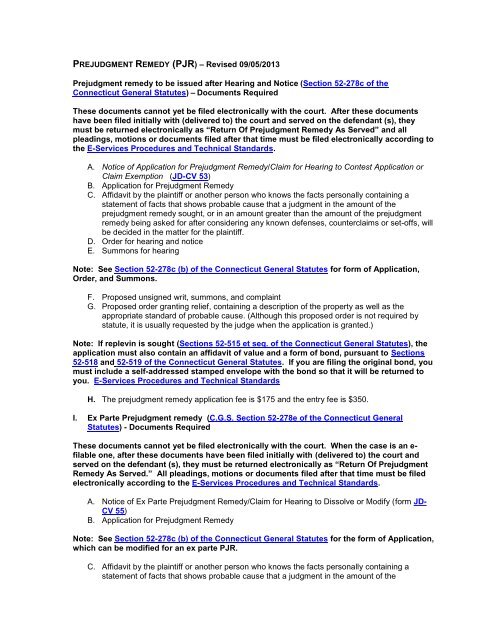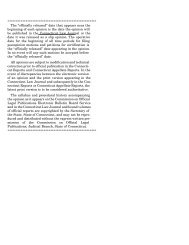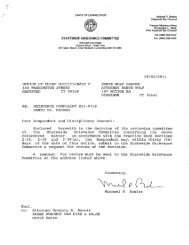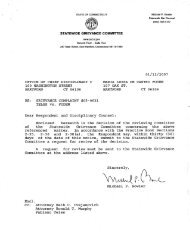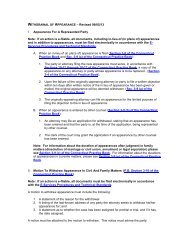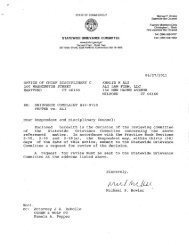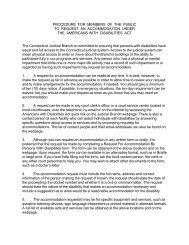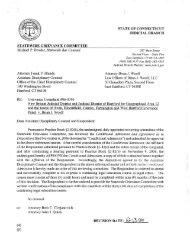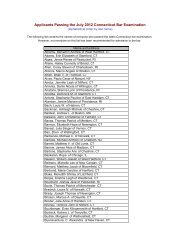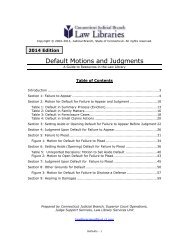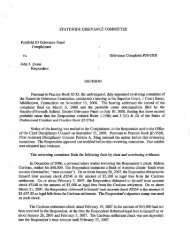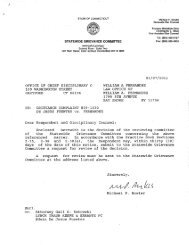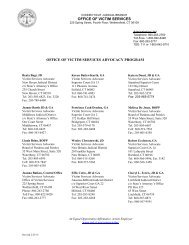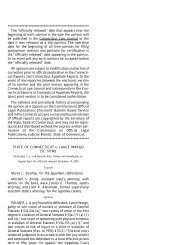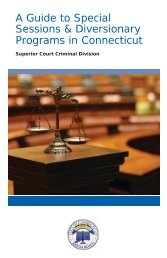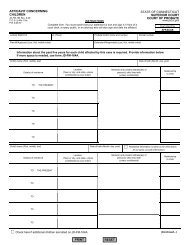Prejudgment Remedy (PJR) - Revised 02/01/13
Prejudgment Remedy (PJR) - Revised 02/01/13
Prejudgment Remedy (PJR) - Revised 02/01/13
- No tags were found...
You also want an ePaper? Increase the reach of your titles
YUMPU automatically turns print PDFs into web optimized ePapers that Google loves.
PREJUDGMENT REMEDY (<strong>PJR</strong>) – <strong>Revised</strong> 09/05/2<strong>01</strong>3<br />
<strong>Prejudgment</strong> remedy to be issued after Hearing and Notice (Section 52-278c of the<br />
Connecticut General Statutes) – Documents Required<br />
These documents cannot yet be filed electronically with the court. After these documents<br />
have been filed initially with (delivered to) the court and served on the defendant (s), they<br />
must be returned electronically as “Return Of <strong>Prejudgment</strong> <strong>Remedy</strong> As Served” and all<br />
pleadings, motions or documents filed after that time must be filed electronically according to<br />
the E-Services Procedures and Technical Standards.<br />
A. Notice of Application for <strong>Prejudgment</strong> <strong>Remedy</strong>/Claim for Hearing to Contest Application or<br />
Claim Exemption (JD-CV 53)<br />
B. Application for <strong>Prejudgment</strong> <strong>Remedy</strong><br />
C. Affidavit by the plaintiff or another person who knows the facts personally containing a<br />
statement of facts that shows probable cause that a judgment in the amount of the<br />
prejudgment remedy sought, or in an amount greater than the amount of the prejudgment<br />
remedy being asked for after considering any known defenses, counterclaims or set-offs, will<br />
be decided in the matter for the plaintiff.<br />
D. Order for hearing and notice<br />
E. Summons for hearing<br />
Note: See Section 52-278c (b) of the Connecticut General Statutes for form of Application,<br />
Order, and Summons.<br />
F. Proposed unsigned writ, summons, and complaint<br />
G. Proposed order granting relief, containing a description of the property as well as the<br />
appropriate standard of probable cause. (Although this proposed order is not required by<br />
statute, it is usually requested by the judge when the application is granted.)<br />
Note: If replevin is sought (Sections 52-515 et seq. of the Connecticut General Statutes), the<br />
application must also contain an affidavit of value and a form of bond, pursuant to Sections<br />
52-518 and 52-519 of the Connecticut General Statutes. If you are filing the original bond, you<br />
must include a self-addressed stamped envelope with the bond so that it will be returned to<br />
you. E-Services Procedures and Technical Standards<br />
H. The prejudgment remedy application fee is $175 and the entry fee is $350.<br />
I. Ex Parte <strong>Prejudgment</strong> remedy (C.G.S. Section 52-278e of the Connecticut General<br />
Statutes) - Documents Required<br />
These documents cannot yet be filed electronically with the court. When the case is an e-<br />
filable one, after these documents have been filed initially with (delivered to) the court and<br />
served on the defendant (s), they must be returned electronically as “Return Of <strong>Prejudgment</strong><br />
<strong>Remedy</strong> As Served.” All pleadings, motions or documents filed after that time must be filed<br />
electronically according to the E-Services Procedures and Technical Standards.<br />
A. Notice of Ex Parte <strong>Prejudgment</strong> <strong>Remedy</strong>/Claim for Hearing to Dissolve or Modify (form JD-<br />
CV 55)<br />
B. Application for <strong>Prejudgment</strong> <strong>Remedy</strong><br />
Note: See Section 52-278c (b) of the Connecticut General Statutes for the form of Application,<br />
which can be modified for an ex parte <strong>PJR</strong>.<br />
C. Affidavit by the plaintiff or another person who knows the facts personally containing a<br />
statement of facts that shows probable cause that a judgment in the amount of the
prejudgment remedy being asked for, or in an amount greater than the amount of the<br />
prejudgment remedy being asked for after considering any known defenses, counterclaims or<br />
set-offs, will be decided in the matter for the plaintiff AND to show that the defendant:<br />
1. has hidden or will hide himself or herself so that process cannot be served on him or<br />
her; or<br />
2. is about to remove himself or herself or his or her property from this state; or<br />
3. is about to fraudulently dispose of or has fraudulently disposed of any of his or her<br />
property with the intent to hinder, delay or defraud his or her creditors; or<br />
4. has fraudulently hidden or withheld money, property or other items which should be<br />
liable to the satisfaction of his debts.<br />
D. Signed writ, summons, and complaint<br />
E. Proposed order granting ex parte relief (decided on the application of one party only),<br />
containing a description of the property and the correct standard of probable cause.<br />
(Although this proposed order is not statutorily required, it is usually requested by the judge<br />
when the application is granted.)<br />
Note: If replevin is sought (Sections 52-515 et seq. of the Connecticut General Statutes), the<br />
application must also contain an affidavit of value and a form of bond, under Sections 52-518<br />
and 52-519 of the Connecticut General Statutes. If you are filing the original bond, you must<br />
include a self-addressed stamped envelope with the bond so that it will be returned to you. E-<br />
Services Procedures and Technical Standards<br />
F. The <strong>PJR</strong> application fee is $175. The entry fee is $350 and it must be paid when the case is<br />
returned to the court after service on the defendant.<br />
II. <strong>PJR</strong> When Defendant In Commercial Transaction Has Waived Notice And Hearing (Section<br />
52-278f of the Connecticut General Statutes) - Documents Required<br />
Note: These documents must be served on the Defendant. After service on the Defendant,<br />
these documents must be returned electronically to the Court in accordance with the E-<br />
Services Procedures and Technical Standards.<br />
A. A Notice of Ex Parte <strong>Prejudgment</strong> <strong>Remedy</strong>/Claim for Hearing to Dissolve or Modify (form JD-<br />
CV 55) may be used to meet the requirement of notice in Section 52-278f of the<br />
Connecticut General Statutes.<br />
B. Signed complaint that includes a copy of the waiver<br />
C. Affidavit by the plaintiff or another person who know the facts personally containing a<br />
statement of facts that show probable cause that a judgment in the amount of the<br />
prejudgment remedy being asked for, or in an amount greater than the amount of the<br />
prejudgment remedy being asked for after considering any known defenses, counterclaims or<br />
set-offs, will be rendered in the matter for the plaintiff.<br />
Note: If replevin is sought (Sections 52-515 et seq. of the Connecticut General Statutes), the<br />
application must also contain an affidavit of value and a form of bond, under Sections 52-518<br />
and 52-519 of the Connecticut General Statutes. If you are filing the original bond, you must<br />
include a self-addressed stamped envelope with the bond so that it will be returned to you. E-<br />
Services Procedures and Technical Standards<br />
D. There is no <strong>PJR</strong> application fee. The entry fee is $350 and it must be paid when the case is<br />
returned to the court after service on the defendant.


